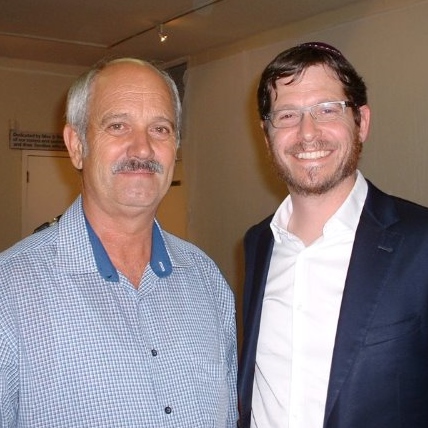
Featured Item

Most unlikely friendship between Madiba, jailer
MOIRA SCHNEIDER
Brand was the keynote speaker at the event which featured a shiur by the spiritual leader of the congregation, Rabbi Dovid Wineberg; tips on keeping children interested at the seder table from Rebbetzen Sara Wineberg; and a multimedia presentation by the shul’s Cantor Ivor Joffe including songs of the seder.
Brand replied that his famous charge had insisted that his fellow prisoners study and “through their studies they network (with) each other to keep their minds”. When new prisoners were brought in after the 1976 uprising, “they were encouraged because they realised the Struggle was still continuing outside”, he added.
Some prisoners queried the point of studying as they were going to die in prison, he said. Mandela’s retort was that their certificates would remain for their families who would think: “Even if he died in prison, he didn’t waste his time.”
Brand’s son didn’t escape Mandela’s attentions in this regard either. During his presidency or shortly thereafter, on learning that the young man wanted to study engineering, he arranged a bursary for him in New York, assuring Brand that “the comrades will look after him”.
Much to Brand’s embarrassment, his son then changed his mind, saying that he wanted to become a commercial diver. When Mandela heard this, he said: “Bring the boy to my house.”
Excusing himself from Brand, he had a private conversation with the son. On his return he said: “We must listen to our children – if he makes a mistake, he’ll learn from his mistakes.”
Mandela then paid for a scholarship for the son to become a commercial diver and, Brand suspects, arranged his first job on Robben Island. Sadly, the young man died in a car accident in 2005.
“Mandela phoned the next day and said how bad it was to lose a child (as he had).” He, Ahmed Kathrada and Barbara Hogan were among those who attended the funeral.
Brand recalled his arrival as a 19-year-old warder on Robben Island in 1978 and how he had been told that he was about to meet “the biggest criminals in the history of South Africa”. On entering the isolation section, he was taken aback to be greeted politely by an elderly African gentleman, Rivonia Trialist Andrew Mlangeni.
“I couldn’t believe they let these old guys do hard labour,” he remembers thinking.
When Mandela learned that Brand had grown up the son of a farm foreman, he asked him for advice on his prison garden.
He also had a piece of advice for Brand: “After you’ve locked up the prisoners at night, you’ve got all the time – you must use it to study.”
Brand recalled an incident when Winnie Mandela had smuggled a grandchild onto the island and through an elaborate subterfuge, he had managed to let Mandela have sight of the baby. This was kept secret for many years until 1994 when then-President Mandela had called him over at Parliament, where Brand was by then employed, announcing: “This is the most important man – he risked his life for me.”
Brand remembered his 1982 transfer to Pollsmoor Prison with Mandela and three of his comrades. The strict isolation in which they were kept, including from other warders, had the paradoxical result that “for the first time we could drink a cup of coffee with the prisoners and play tennis with them!”
Brand has so many memories of this country’s icon during a time when the rest of South Africa didn’t even know what Madiba looked like. He was witness to Mandela – like the Jews of Egypt – being forced to do slave labour. However, Mandela’s memory is kept alive every day in this man, who was his most unlikely friend.




